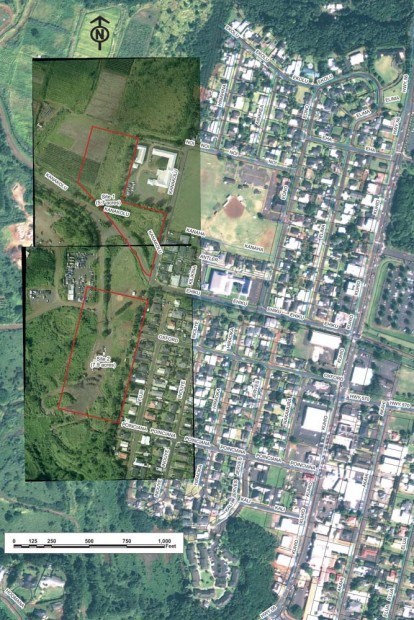LIHU‘E — County anti-drug coordinator Theresa Koki announced two sites for an adolescent drug treatment center Thursday at the Lihu‘e Neighborhood Center. Both sites are in the proximity of the Isenberg and Kaua‘i Gardens subdivisions, in Lihu‘e. “We all agree
LIHU‘E — County anti-drug coordinator Theresa Koki announced two sites for an adolescent drug treatment center Thursday at the Lihu‘e Neighborhood Center. Both sites are in the proximity of the Isenberg and Kaua‘i Gardens subdivisions, in Lihu‘e.
“We all agree that we need a location,” Mayor Bernard Carvalho Jr. said. “But I knew it would be a challenge.”
The 100-plus people, including recovering addicts, residents, county officials and service-provider representatives gathered to hear the announcement, the consensus being that a treatment center needs to be built on Kaua‘i, despite concerns on the announced locations.
Koki said the sites were settled upon after county representatives visited several proposed sites.
“Grove Farm approached the county to site the facility on their land,” Carvalho said. “They recognize that land is valuable, and you cannot put a value on life.”
The sites were selected because of their central location and proximity to infrastructure and other support facilities such as the hospital, the airport, and the judicial system, Koki said.
“I’ll be the first person to stand in line to say we need the center,” said Kaua‘i Police Department officer Luke Hamberg. “But I have concerns. I visit my in-laws almost daily who live on Fuji Street because I have animals. Why is it located right behind the houses?”
Carvalho assured the people that he understands the uncomfortable feelings of the neighboring residents, but the first step is to make a decision on a location.
“There will be a series of meetings where people’s concerns will be addressed,” Carvalho said. “These are our kids and we will build the center, together.”
Nathaniel Evslin, a new resident in the Isenberg subdivision, questioned the proximity of the two sites.
“We have to save the children,” Evslin said. “But who will save the neighborhood?”
Former police officer Mark Rivera said he lives in Kaua‘i Gardens, where a transition house for Kaua‘i Community Correctional Center is located.
He said the neighbors have been good, generally, but there are some who do not follow the rules.
“With any establishment, there is a percentage that don’t make it. The people who live in this subdivision are elderly who cannot defend themselves. I want a treatment center, but not at the expense of community. I already sleep with one eye open, do you want me to sleep with two eyes open?”
In support for the adolescent drug treatment center, Koki said the Kaua‘i Juvenile Court has shown a rise from five to 18 admissions between the 2006 and 2010.
Underage-drinking arrests for operating a vehicle under the influence of intoxicants has risen to 40 arrests in 2010 compared with 28 arrests in 2009, 29 arrests in 2008, and 28 arrests in 2007.
She pointed out that on Kaua‘i, the age of first use for males is 11 years old, and for females, is 13 years old.
Koki said there is an average of between six to 12 students sent off-island for treatment yearly. Under the Mokihana Project, a partnership with the Department of Education and the Department of Health, there are currently six children on O‘ahu — four at Bobby Benson and two are Marimed.
KCCC warden Neal Wagatsuma, a resident of Kaua‘i Gardens, said there is no such thing as ideal.
“This is the best location,” he said. “Opportunity doesn’t come around as often as we want. We need to take advantage of this.”
He said the treatment center is a good investment and there are good people behind it.
Councilman Mel Rapozo was the only council member to speak. Derek Kawakami also attended the meeting.
“Everyone is touched by drugs,” Rapozo said, choking back his emotions. “We can fix holes in the street, but we cannot fix kids. The council can’t do anything for them. We fight to save whales and seals, we move developments because of blind cave spiders who can’t even see. We have the opportunity to be part of the solution. Let’s not postpone this.”
Recovering addict Farren Block said she lives in a clean and sober house.
“It’s a godsend,” she said. “I don’t know what I would do if I had to go off-island. If I had help 40 years ago, I wouldn’t be here, today. I agree with the site.”
Kimberly Cummings, director of a nonprofit organization that helps recovering women, said 10 years ago people spent their money on her. She is now returning the favor.
“We have a responsibility to help them heal,” said Cummings, an addict for 25 years. “The kids need help. We are responsible. The disease is treatable, people!”
Koki said negotiations with Grove Farm will continue, and the county will host another meeting to discuss the next steps for the treatment center.
Next meeting will be on March 3, from 6-7:30 p.m. at the Lihu‘e Neighborhood Center.
Call the Anti-Drug office at 241-4925 for more information.


